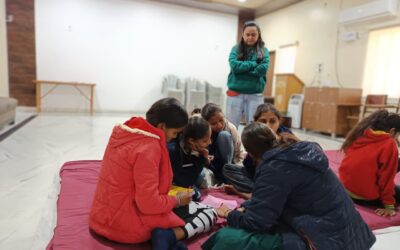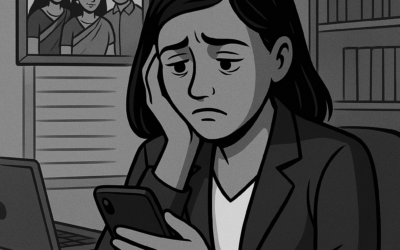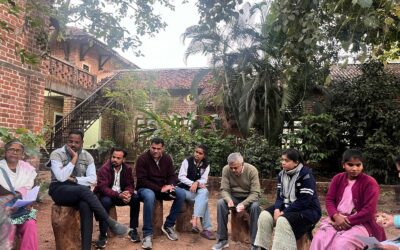Miscommunication And A New Responsibility
On October 25, 2024, I visited Kalaunjar school to conduct a teacher’s meeting. Just as I was about to leave, I called my Program coordinator to brief about an upcoming parents’ meeting. During the call, he suggested organizing an activity in the school and community to raise awareness about noise and air pollution in the context of Diwali. He briefly explained the concept and gave me full responsibility for planning and execution.
I was excited to take on the responsibility and soon met a few students who had shown enthusiasm in previous activities. While brainstorming ideas, I suddenly recalled an incident I had witnessed in the same village. Some time ago, I stayed in Kalaunjar after a meeting with a Panchayati Raj Institution member. The meeting was held in the Panchayat Bhavan, where preparations were underway for a “bhoj” (meal prepared on someone’s death on 12th day) the next day.
The following morning, while on a walk with my colleague, I saw two villagers dumping the leftovers and waste from the “bhoj” into the river. The garbage included thermocol dishes, plastic glasses, bowls and food scraps.
The sight shocked me, but I was too stunned to react.
Creative Planning And A Setback
This memory inspired me to recreate the scene as a drama, aligning with what I believed was the intended theme of environmental awareness. I approached the school principal and obtained permission for the activity. However, this marked the beginning of a miscommunication. I had misunderstood my coordinator’s instructions, assuming the theme could revolve around any environmental issue. Instead, he specifically wanted to focus on noise and air pollution.
I explained the river pollution concept to the students, and together we planned a skit. Preparations went smoothly for two days. On the third day, during the weekly office meeting, I updated him about the skit and its theme. He immediately pointed out the discrepancy and asked me to shift the focus to noise and air pollution. Initially, I disagreed with his feedback.
A close friend had once told me I tend to back down when my ideas are challenged without clearly explaining my perspective. However, with only two days left, I decided to align with his directive.
Fear, Pressure, And Adaptation
I informed the students about the change in theme and proposed organizing a rally instead. The students were visibly disappointed, and I, too, felt unhappy with the sudden shift. Despite this, I provided them with slogans and ideas for posters to prepare at home.
The next day, the students arrived without completing the assigned work. This added to my stress, as this was my first independent activity. To complicate matters, my colleague had informed me earlier that he would be on leave on the rally day. I felt overwhelmed but remained determined to proceed. I gathered the students, explained the theme again, and encouraged them to create posters after school hours. By the end of the day, all the preparations were finally complete.
That evening, I discussed the rally plans with the teachers. Some raised concerns about why climate change awareness was emphasized during Diwali but overlooked during events like weddings or celebrations like India’s World Cup victory. Others pointed out that firecrackers during Diwali were tied to religious traditions. One teacher even feared that the rally might hurt community sentiments, potentially leading to conflict.
I managed the conversation with care and mindfulness, respecting their religious beliefs while emphasizing the importance of environmental awareness. Eventually, the teachers agreed to support the rally. I went home feeling serious about the next day’s event. I couldn’t sleep well because of the mix of emotions—nervousness, excitement, and determination.
Success And Relief
On the rally day, I woke up early and carefully prepared myself. I wore shoes instead of my usual crocs, ironed my clothes, and even applied hair oil—things I rarely do. I wanted to look confidence to the community. The rally was scheduled to start at 10:00 AM, but when I reached the school at 9:30, the students were busy cleaning the premises. It was Saturday, and cleaning duties extended until 11:00 AM—a change in timing that I wasn’t informed and expected about. This delay caused confusion as some teachers and students began asking when we would start.
By the time the cleaning was done, the students were tired, and many teachers hesitated to join. Observing this, even the sunlight was too hard. I felt disheartened and feared that my first activity might turn into a disaster. Suddenly I came up with an idea, I distributed caps and T-shirts meant for the rally, which lifted everyone’s spirits.
I managed to arrange a speaker and began leading the slogans loudly and rhythmically. The students followed suit, and I encouraged them by saying things like, “The boys’ voices aren’t loud enough!” or “The girls are louder than the boys!” This playful competition energized the group, and even some teachers joined in, taking the microphone to lead slogans when I seemed tired. The rally passed through the village with four planned stops for short nukkad nataks and slogans. It concluded within 45 minutes, and we returned to the school. As I entered the school premises, I saw students and teachers smiling, chatting, and taking photos together.

Seeing their happiness gave me a sense of relief and accomplishment. Two teachers invited me to join them for photos. Although I usually avoid being photographed, I happily obliged, feeling proud of what we had achieved together.
This experience taught me the importance of clear communication, adaptability, and perseverance. It reinforced my belief in community engagement and left me eager to take on more responsibilities in the future.




0 Comments